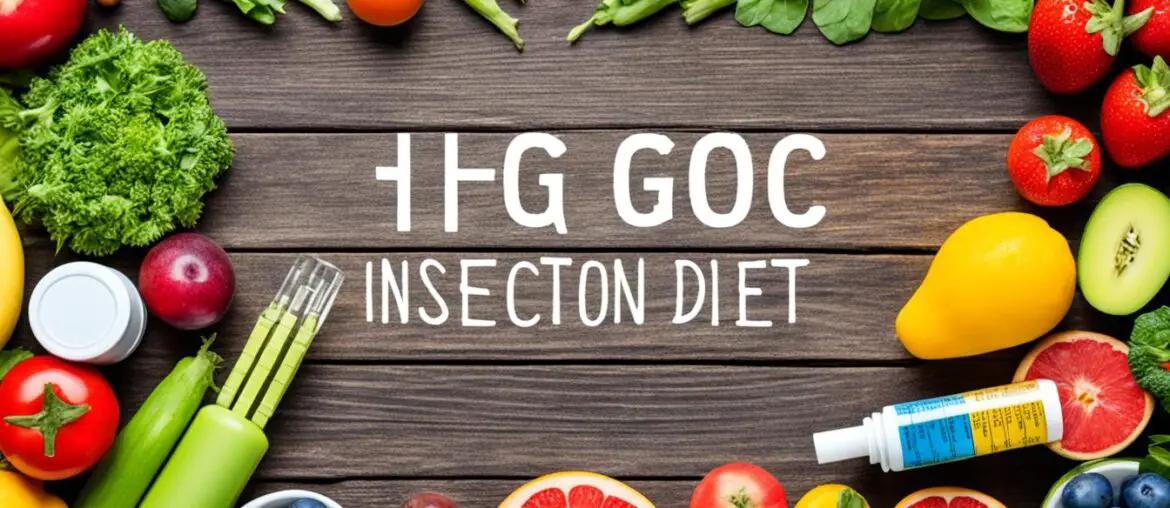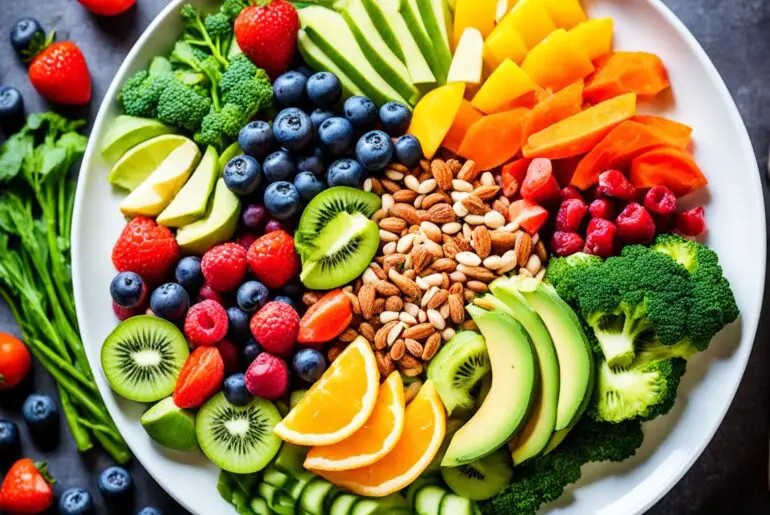Did you know that the HCG diet has been shrouded in myths and misconceptions? It’s time to set the record straight and uncover the truth about HCG diet injections. Contrary to popular belief, the HCG hormone plays a significant role in weight loss by stimulating muscle cells and enhancing the natural hormone cycle. When administered correctly, HCG injections have minimal side effects, and the diet itself leads to sustainable weight loss. Let’s debunk the myths and reveal the facts behind the HCG diet injections!
Key Takeaways:
- HCG diet injections are effective in promoting weight loss by preserving muscle mass and optimizing the body’s metabolic cycle.
- Common side effects of HCG injections, such as light-headedness and mild headaches, are generally mild and minimal.
- The HCG diet is based on a natural hormone synthesized by the body during pregnancy, mobilizing fat cells and converting them into energy.
- The HCG diet can be a safe and sustainable weight loss method when done under medical supervision and with adherence to safety precautions.
- After completing HCG injections, maintaining weight loss requires a low-calorie intake, regular exercise, and a healthy lifestyle.
Myth #1: “HCG doesn’t really do anything. It’s the diet that makes you lose weight.”
One common myth about the HCG diet is that the hormone itself has no impact on weight loss and it is solely the diet that leads to the results. In reality, the HCG hormone stimulates the body’s natural metabolic cycle and prevents it from going into “diet mode.” It helps maintain muscle mass while the body uses stored fat as fuel for weight loss. The diet and the HCG hormone work together to optimize weight loss.
When following the HCG diet, the hormone triggers the body to access its fat reserves for energy. Unlike other diets, which often result in the loss of both fat and muscle mass, the HCG hormone specifically targets stored fat while preserving muscle mass. This is crucial for sustainable weight loss, as losing muscle mass can lead to a decreased metabolic rate and difficulties in maintaining weight loss in the long term.
By stimulating the body’s natural metabolic cycle, the HCG hormone helps to optimize the weight loss process. It keeps the metabolism active and prevents it from slowing down, which can commonly occur during calorie-restricted diets. Additionally, the hormone aids in suppressing appetite, making it easier to adhere to the low-calorie diet and achieve your weight loss goals.
It’s important to note that the HCG diet is not solely reliant on the hormone alone. The diet itself plays a significant role in shaping the weight loss journey. It emphasizes a specific calorie intake and food choices that support the HCG hormone’s effects on the body. By following the prescribed diet plan and incorporating the HCG hormone, individuals can experience enhanced weight loss results compared to dieting alone.
The HCG hormone is not merely a passive component of the HCG diet. It actively contributes to weight loss by stimulating the body’s metabolism and preserving muscle mass while targeting stored fat. The diet and the hormone work hand in hand to optimize results and ensure sustainable weight loss.
Next, let’s debunk another common myth surrounding the HCG diet – the notion of significant side effects associated with HCG diet injections.
Myth #2: “Too many side effects from HCG to be worth it.”
There is a common misconception that the HCG diet comes with significant side effects that outweigh its benefits. However, it is important to note that the majority of side effects associated with the HCG diet are mild and similar to what may occur during pregnancy. These side effects include light-headedness, mild headaches, irritability, constipation, and hair loss.
It is crucial to understand that these side effects are not experienced by everyone and vary from individual to individual. The severity and duration of side effects can also vary. In most cases, these effects tend to be mild and temporary, subsiding as the body adjusts to the HCG diet.
The HCG diet, when administered correctly, has been shown to carry minimal risks in terms of side effects. It is important to follow the prescribed guidelines and consult with a healthcare professional before starting the diet to ensure safety and minimize any potential risks.
The mild side effects associated with the HCG diet should not discourage individuals from considering its potential benefits. The positive effects of the diet, such as weight loss and improved body composition, often outweigh the temporary discomfort caused by mild side effects.
HCG diet side effects are generally manageable and subside as the body adapts to the diet and hormone therapy.
It is important to remember that any significant changes to one’s diet or hormones may come with some adjustment period. The body needs time to adapt, and this can manifest as mild side effects. By closely monitoring your body’s response and seeking medical guidance when necessary, these side effects can be effectively managed.
| SIDE EFFECTS | DESCRIPTION |
|---|---|
| Light-headedness | A feeling of dizziness or faintness that may occur temporarily during the initial stages of the HCG diet. |
| Mild headaches | Headaches that are usually mild and transient, often attributed to the body adjusting to the diet and hormone therapy. |
| Irritability | Some individuals may experience heightened emotional sensitivity or irritability while on the HCG diet. This effect is likely to be temporary. |
| Constipation | A temporary change in bowel movements that may occur due to factors such as the low-calorie intake and dietary adjustments involved in the HCG diet. |
| Hair loss | Some individuals may experience increased hair shedding during the HCG diet. This is typically temporary and resolves once the diet is completed. |
It is essential to note that while side effects can occur, they are often mild and transient. Monitoring your body’s response and maintaining communication with your healthcare professional will help ensure both safety and comfort throughout your HCG diet journey.
Myth #3: “HCG hormone injections are too dangerous.”
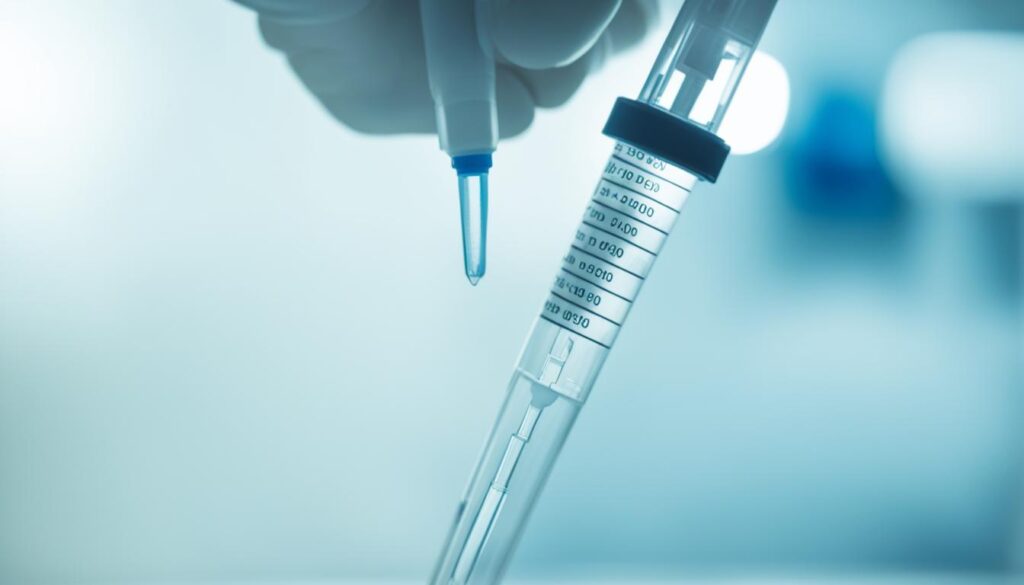
Contrary to popular belief, HCG hormone injections, when administered under proper medical supervision, are considered safe and effective for weight loss. Combining HCG injections with a low-calorie diet is a powerful combination that can reset the metabolism and facilitate weight loss without hunger or weakness.
The safety of HCG injections lies in the monitoring and guidance provided by healthcare professionals. They ensure that the injections are administered correctly and in the appropriate dosage. With their expertise, the risk involved in HCG injections is minimal.
HCG injections work by stimulating the body’s metabolism and promoting the breakdown of stored fat for energy. This process allows for significant weight loss while preserving muscle mass. The low-calorie diet complements the HCG injections, providing the necessary nutrients and supporting overall health.
“HCG hormone injections, when performed under proper medical supervision, are considered safe.”
Combining the power of HCG injections and a low-calorie diet resets the body’s metabolism. This leads to efficient weight loss without the adverse effects often associated with traditional dieting methods. HCG injections help individuals achieve their weight loss goals while maintaining energy levels and overall well-being.
The misconception that HCG injections are dangerous stems from a lack of understanding and misinformation. It is essential to seek guidance from healthcare professionals who can provide accurate information and ensure safe administration.
The Benefits of HCG Hormone Injections:
- Promotes efficient weight loss
- Preserves muscle mass
- Supports metabolism reset
- Provides energy during a low-calorie diet
When misconceptions are dispelled and accurate information is understood, it becomes evident that HCG hormone injections can be a safe and effective method for achieving weight loss goals. Choosing the guidance of a healthcare professional and adhering to safety precautions maximizes the benefits and minimizes any potential risks.
Myth #4: “The HCG diet is not natural or healthy.”
Some believe that the HCG diet is unnatural and unhealthy. However, the HCG diet is based on a natural hormone synthesized within the human body during pregnancy. The HCG hormone plays a crucial role in the body’s metabolic processes. It mobilizes fat cells and efficiently converts them into energy, resulting in weight loss.
The HCG diet may involve a low-calorie intake, but it is essential to note that it still promotes a balanced diet that provides the body with the necessary nutrients for overall health. The diet encourages the consumption of whole foods, lean proteins, fruits, vegetables, and healthy fats, ensuring that individuals receive a wide range of essential vitamins and minerals.
By following the HCG diet plan, individuals can achieve their weight loss goals while nourishing their bodies with the key nutrients they need to thrive. Contrary to the myth, the HCG diet is a natural and healthy approach to weight loss.
Myth #5: “HCG diet does not bring sustainable results.”
Contrary to popular belief, the HCG diet can indeed deliver sustainable weight loss results. To ensure long-term success, the HCG diet incorporates a crucial maintenance phase that helps the body adjust and sustain weight loss even after the injections are discontinued.
During the maintenance phase, individuals are advised to follow a low-calorie intake and maintain a balanced diet. This phase is essential as it allows the body to stabilize and establish new habits that support sustained weight loss.
By adhering to a low-calorie intake, individuals can continue to shed excess pounds while ensuring that their body receives the necessary nutrients. The goal is to strike a balance between promoting weight loss and maintaining overall health.
The maintenance phase of the HCG diet is designed to encourage individuals to adopt a healthy and balanced lifestyle in the long run. This involves making mindful dietary choices, engaging in regular physical activity, and integrating healthy habits into daily routines.
The key to sustainable weight loss lies not only in the initial phase of the HCG diet but also in the ability to maintain a healthy lifestyle beyond the injections. Embracing a well-rounded approach that combines a low-calorie intake, balanced diet, and regular exercise is essential for achieving lasting results.
The Benefits of the HCG Diet Maintenance Phase
The maintenance phase of the HCG diet offers several benefits that contribute to sustainable weight loss. These include:
- Preventing weight regain: By gradually reintroducing more calories into the diet, the maintenance phase helps individuals avoid the common pitfall of weight regain.
- Maintaining metabolic rate: The maintenance phase helps the body maintain an efficient metabolic rate, which supports continued fat burning and prevents the plateau often experienced in other diets.
- Establishing healthy habits: The maintenance phase provides an opportunity to develop sustainable healthy habits, such as portion control, mindful eating, and regular exercise.
By embracing the maintenance phase of the HCG diet and adopting a long-term approach, individuals can achieve sustainable weight loss and enjoy improved overall well-being.
Sample HCG Diet Maintenance Phase Meal Plan
| Meal | Food | Calories |
|---|---|---|
| Breakfast | Scrambled eggs with vegetables | 250 |
| Lunch | Grilled chicken salad | 350 |
| Snack | Greek yogurt with berries | 150 |
| Dinner | Salmon with roasted vegetables | 400 |
| Snack | Apple with almond butter | 200 |
The Science Behind HCG Diet Injections
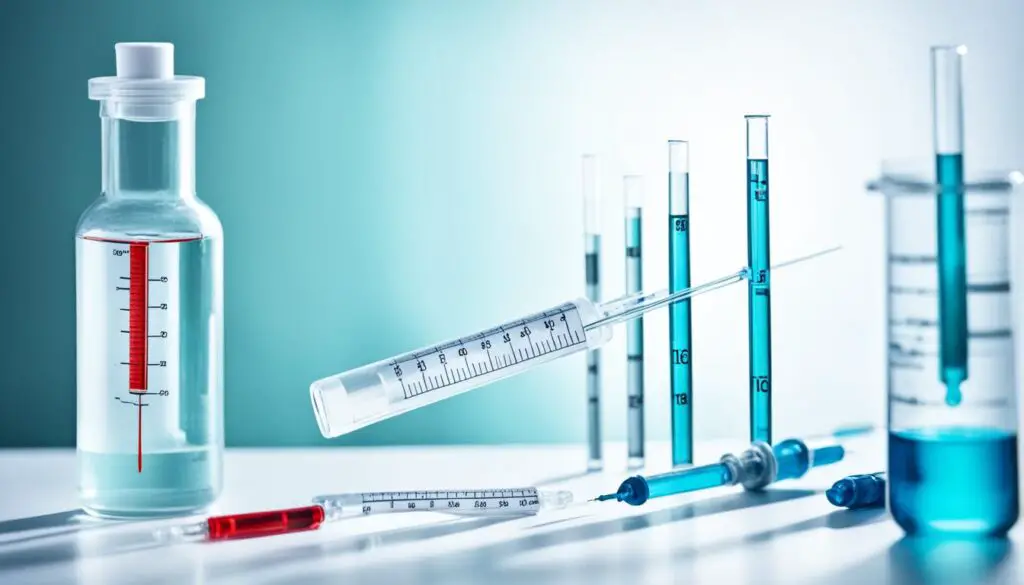
The HCG diet utilizes injections of the hormone human chorionic gonadotropin (HCG) as part of a hormone therapy diet. HCG stimulates the follicles of muscle cells and enhances the body’s natural hormone cycle. This hormone is synthesized within the body during pregnancy and plays a crucial role in mobilizing fat cells and converting them into energy.
When combined with a low-calorie diet, HCG injections work to optimize weight loss. The injections help preserve muscle mass while the body uses stored fat for energy, ensuring that weight loss primarily comes from fat stores rather than muscle tissue.
HCG injections promote a continuous metabolic cycle, preventing the body from entering a “diet mode” where it conserves energy and slows down weight loss. By enhancing the natural hormone cycle, the injections contribute to sustained weight loss and prevent the loss of muscle mass.
The HCG diet injections, when administered correctly and under medical supervision, can be effective in helping individuals achieve their weight loss goals. By utilizing the hormone human chorionic gonadotropin, the diet harnesses the body’s natural mechanisms to optimize weight loss while minimizing muscle loss and maintaining energy levels. This combination of hormone therapy and a low-calorie diet is believed to provide a balanced approach to weight loss.
The Controversy Surrounding the HCG Diet
The HCG diet has been a topic of controversy among experts and individuals seeking weight loss solutions. Some question its effectiveness in achieving significant and sustainable weight loss. To evaluate the controversy and determine the facts, it is crucial to consider clinical trials, the role of caloric intake, and the potential influence of the placebo effect.
The Role of Clinical Trials
Clinical trials have shown that the HCG hormone itself has no inherent effect on weight loss. However, the effectiveness of the HCG diet should not be solely attributed to the hormone. Instead, weight loss results from the calorie-restricted diet that accompanies HCG injections.
The Impact of Caloric Intake
The HCG diet involves a strict low-calorie intake, typically ranging from 500 to 800 calories per day. This significant reduction in calories forces the body to rely on stored fat for energy, resulting in weight loss. The caloric deficit created by the diet is a scientifically proven method for achieving weight loss.
The Placebo Effect Conundrum
Controversy surrounding the HCG diet arises from the potential placebo effect and the anecdotes of successful weight loss associated with HCG injections. The placebo effect refers to the psychological response that occurs when an individual believes they are receiving a treatment that will lead to desired outcomes. Placebo-driven weight loss experiences may influence the perception of the diet’s effectiveness.
“While the HCG hormone itself may not directly contribute to weight loss, the calorie restriction prescribed in the HCG diet guarantees a calorie deficit, ultimately leading to weight loss.”
When assessing the effectiveness of any diet, it is crucial to rely on scientific evidence and data rather than personal anecdotes or placebo-driven experiences. Research-supported facts and comprehensive studies should guide our understanding of the HCG diet and its potential to achieve weight loss goals.
The Importance of Medical Supervision

When embarking on the HCG diet, it is crucial to prioritize medical supervision to ensure both safety and effectiveness. Under the guidance of healthcare professionals, individuals can receive a customized diet plan and the appropriate dosage of HCG injections tailored to their specific needs. By entrusting the process to medical experts, potential risks can be minimized, and optimal results can be achieved.
Medical supervision plays a vital role in creating a comprehensive and personalized diet plan. Healthcare professionals take into account various factors such as the individual’s medical history, current health condition, and weight loss goals. With this information, they can develop a diet plan that aligns with the individual’s unique circumstances, ensuring that the HCG diet is safe and suitable for their specific needs.
Furthermore, medical supervision is essential in prescribing the correct dosage of HCG injections. The precise administration and monitoring of the injections are crucial to maintain a safe and effective weight loss journey. By having healthcare professionals oversee the process, individuals can have peace of mind knowing that their injections are properly administered, minimizing the risk of complications.
Aside from personalized guidance, medical supervision also helps individuals adhere to important safety precautions. Healthcare professionals can educate and inform individuals about the potential side effects of the HCG diet, such as mild headaches, light-headedness, irritability, constipation, and hair loss. By being aware of these possible effects, individuals can take necessary precautions and make informed decisions throughout their weight loss journey.
Benefits of Medical Supervision:
- Customized and personalized diet plans
- Precise dosage of HCG injections
- Minimization of potential risks
- Educational guidance on safety precautions
Medical supervision is an invaluable component of the HCG diet. By entrusting the process to healthcare professionals, individuals can ensure their safety, receive tailored guidance, and optimize their chances of achieving successful and sustainable weight loss.
When considering the HCG diet, consult with a healthcare professional who specializes in medical weight loss. Their expertise will provide the necessary supervision, support, and guidance throughout the journey, ensuring that the diet plan and injections are administered correctly and safely. By prioritizing medical supervision, individuals can embark on their weight loss journey with confidence and peace of mind.
Maintaining Weight Loss After HCG Injections

Once you have completed your HCG injections, it is crucial to focus on maintaining the weight loss you have achieved. This requires a multi-faceted approach that includes a low-calorie intake, regular exercise, and adopting a healthy and balanced lifestyle.
Following a low-calorie intake is vital to prevent weight regain. While the HCG injections have helped you lose weight, it is important to continue practicing portion control and making mindful food choices. This can be achieved by incorporating nutrient-dense foods into your diet and avoiding high-calorie processed foods.
Regular exercise is another key component in maintaining weight loss. Engaging in physical activity not only helps to burn calories but also improves overall well-being. Incorporate a variety of exercises into your routine, such as cardio, strength training, and flexibility exercises, to ensure a well-rounded fitness regimen.
In addition to a low-calorie intake and exercise, adopting a healthy and balanced lifestyle is crucial for sustained weight loss. This includes getting adequate sleep, managing stress levels, and prioritizing self-care. Taking care of your overall well-being will support your weight maintenance efforts and contribute to a healthier lifestyle.
Remember, sustained weight loss requires long-term commitment and adherence to healthy habits. It is important to stay consistent with your low-calorie intake, regular exercise, and healthy lifestyle choices. By making these changes a permanent part of your routine, you can enjoy the benefits of your weight loss journey and maintain your progress over time.
“Maintaining weight loss is a lifelong journey that requires dedication and consistency. By following a low-calorie intake, engaging in regular exercise, and adopting a healthy lifestyle, you can ensure the long-term success of your weight loss efforts.”
Tips for Maintaining Weight Loss After HCG Injections
| Tip | Description |
|---|---|
| 1 | Follow a low-calorie intake |
| 2 | Incorporate regular exercise into your routine |
| 3 | Make healthy and balanced food choices |
| 4 | Get adequate sleep |
| 5 | Manage stress levels |
| 6 | Practice self-care |
Implementing these tips will help you establish a solid foundation for maintaining weight loss and enjoying a healthier lifestyle even after completing your HCG injections.
Exploring the Safety Precautions of the HCG Diet
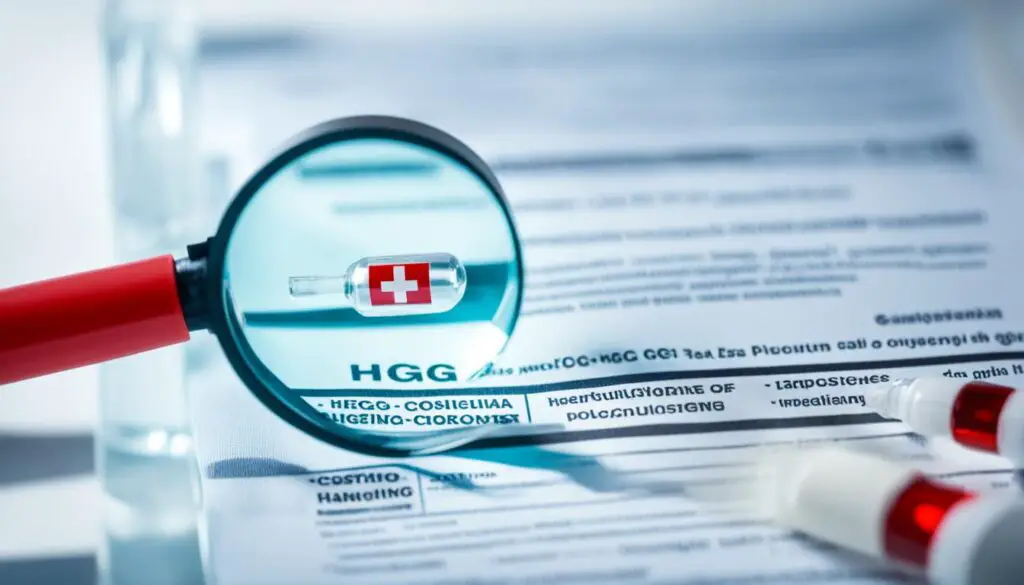
The HCG diet is a popular weight loss method that requires adherence to several safety precautions to ensure optimal results. Medical supervision, proper administration of HCG injections, and awareness of potential side effects are essential when embarking on this diet.
Medical Supervision
Undergoing the HCG diet under medical supervision is crucial for safety and efficacy. Healthcare professionals can provide personalized guidance, create a tailored diet plan, and prescribe the appropriate dosage of HCG injections. This supervision helps minimize potential risks and ensures the diet is followed correctly for the best outcome.
Proper Administration of HCG Injections
Administering HCG injections correctly is vital to the success of the diet. It is essential to follow the instructions provided by healthcare professionals or medical practitioners to ensure proper administration. This includes using sterile needles, maintaining a clean environment, and adhering to the recommended dosage.
Potential Side Effects
Being aware of potential side effects is crucial when undertaking the HCG diet. While they are generally mild and temporary, such as light-headedness, headaches, irritability, constipation, and hair loss, it is important to monitor any changes and consult with a healthcare professional if necessary.
“When followed correctly and with professional guidance, the HCG diet can be a safe and effective weight loss method.”
By following these safety precautions and seeking professional guidance, individuals can experience the benefits of the HCG diet while minimizing any potential risks. It is essential to prioritize safety throughout the journey to achieve the desired weight loss goals.
Conclusion
The HCG diet has been the subject of numerous myths and misconceptions. However, by debunking these myths and focusing on the facts, it becomes clear that the HCG diet is an effective and safe method for sustainable weight loss.
When followed correctly, under proper medical supervision and adherence to safety precautions, the HCG diet can lead to significant weight loss results. It combines a low-calorie intake with HCG hormone injections to optimize weight loss while preserving muscle mass. The diet is based on a natural hormone synthesized by the body during pregnancy, making it a safe option.
It is crucial to consult with a healthcare professional before starting the HCG diet to determine if it is the right fit for you. They can provide personalized guidance throughout the process, ensuring that the diet is followed correctly and safely. By following these precautions, individuals can achieve sustainable weight loss and enjoy the benefits of the HCG diet.
FAQ
What role does the HCG hormone play in the HCG diet?
The HCG hormone stimulates the body’s natural metabolic cycle and prevents it from going into “diet mode.” It helps maintain muscle mass while the body uses stored fat as fuel for weight loss.
Are there any side effects from HCG hormone injections?
Some individuals may experience light-headedness, mild headaches, irritability, constipation, or hair loss. However, these effects are generally mild and similar to what may occur during pregnancy.
Are HCG hormone injections dangerous?
When administered correctly and under medical supervision, HCG injections are considered safe. They help reset the metabolism and facilitate weight loss without hunger or weakness.
Is the HCG diet natural and healthy?
The HCG diet is based on a hormone that is naturally synthesized within the human body during pregnancy. The hormone mobilizes fat cells and converts them into energy. The diet itself provides the body with the necessary nutrients.
Does the HCG diet lead to sustainable weight loss?
Yes, the HCG diet includes a maintenance phase that helps the body adjust to sustaining weight loss even after the injections are discontinued. During this phase, individuals are encouraged to maintain a low-calorie intake and follow a balanced diet for long-term success.
What is the science behind HCG diet injections?
The HCG diet utilizes injections of the hormone human chorionic gonadotropin (HCG) as part of a hormone therapy diet. HCG stimulates the follicles of muscle cells and enhances the body’s natural hormone cycle, leading to a continuous metabolic cycle and optimal weight loss.
Why has the HCG diet faced controversy?
Clinical trials have shown that HCG itself has no effect on weight, leading to skepticism about its effectiveness for weight loss. However, the combination of the restricted caloric intake of the diet and the placebo effect may contribute to successful weight loss anecdotes.
Why is medical supervision important during the HCG diet?
Medical supervision ensures a customized diet plan, proper administration of HCG injections, and minimized risks. Healthcare professionals can provide guidance throughout the process for optimal safety and efficacy.
How can weight loss be maintained after completing HCG injections?
Weight maintenance after HCG injections involves following a low-calorie intake, engaging in regular exercise, and adopting a healthy and balanced lifestyle to prevent weight regain.
What safety precautions should be followed during the HCG diet?
Safety precautions include undergoing the diet under medical supervision, ensuring proper administration of HCG injections, and being aware of potential side effects such as light-headedness, headaches, irritability, constipation, and hair loss.
What is the conclusion regarding the HCG diet?
Debunking the myths surrounding the HCG diet reveals that it can be an effective and safe weight loss method. When done correctly, with proper medical supervision and adherence to safety precautions, the HCG diet can lead to sustainable weight loss.

